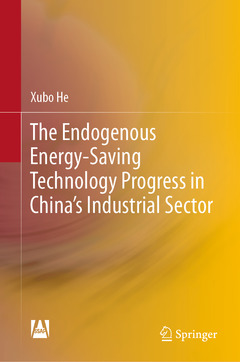Description
The Endogenous Energy-Saving Technological Change in China's Industrial Sector, 1st ed. 2023
Author: He Xubo
Language: English
Subjects for The Endogenous Energy-Saving Technological Change in...:
The Endogenous Energy-Saving Technological Change in China's Industrial Sector
Publication date: 12-2023
165 p. · 15.5x23.5 cm · Paperback
Publication date: 12-2023
165 p. · 15.5x23.5 cm · Paperback
The Endogenous Energy-Saving Technology Progress in China's Industrial Sector
Publication date: 11-2022
165 p. · 15.5x23.5 cm · Hardback
Publication date: 11-2022
165 p. · 15.5x23.5 cm · Hardback
Description
/li>Contents
/li>Biography
/li>Comment
/li>
As improving energy efficiency and increasing energy R&D investment may be the main means for China's industrial sector to achieve sustainable growth, this book attempts to unify energy use efficiency and energy R&D inputs into a standardized economic analysis framework. By distinguishing between energy R&D inputs and non-energy R&D inputs, this book draws on the research paradigm of neoclassical economics to clarify the basic concepts and endogenous mechanisms of energy-saving technological progress as a logical starting point. Under the framework of the existing endogenous growth theory analysis, the heterogeneous R&D inputs are divided into two different mechanisms that affect energy use efficiency, namely factor substitution effect and energy-efficient input increase effect, and a heterogeneous R&D input is constructed. This book constructed an analytical framework for endogenous energy-saving technological progress in the industrial sector based on heterogeneous R&D inputs; it established a mathematical model for the endogenous energy-saving technological advancement of the industrial sector based on heterogeneous R&D inputs; it estimated the energy-saving technological progress rate of 37 Chinese industrial sub-sectors from 1980 to 2010; fourth, it has empirically examined the relationship between the heterogeneous R&D investment in China's industrial sector and its energy-saving technological advancement rate.
Chapter 1. Introduction.- Chapter 2. Literature review.- Chapter 3. Analytical framework for endogenous energy-saving technological progress in industrial sectors based on heterogeneous R&D inputs.- Chapter 4. Mathematical Model Analysis of Endogenous Energy-Saving Technology Advancement in Industrial Sector Based on Heterogeneous R&D Inputs.- Chapter 5. Estimation of energy-saving technological advancement rate in China's industrial sub-sector: 1980-2010.- Chapter 6. Empirical Analysis of Endogenous Energy-Saving Technology advancemnet in China's Industrial Sector Based on Heterogeneous R&D Input.- Chapter 7. Main conclusions and research prospects.
He, Xubo, male, is an assistant research fellow of Yunnan University. He got Ph.D. in Economics from Xi'an Jiaotong University, China, in 2014. Since 2015, he works at the School of Development Study of Yunnan University. His research interests and research expertise are environmental economics.
Reveals how heterogeneous R&D investments endogenously generate energy-saving technological progress Presents how to estimate the energy-saving technological progress rate of China's industrial sub-sectors Looks into the impact of heterogeneous R&D investment in China's industrial sub-sectors
© 2024 LAVOISIER S.A.S.




